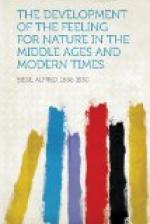[Footnote 5: J.G. Sulzer’s Unterredungen ueber die Schoenheit der Naetur nebst desselben moralischen Betrachtungen ueber besondere Gegenstaende der Naturlehre is typical. Charites describes his conversion to the love of Nature by his friend Eukrates. Eukrates woke him at dawn and led him to a hill close by, as the sun rose. The fresh air, the birds’ songs, and the wide landscape move him, and Eukrates points out that the love of Nature is the ’most natural of pleasures,’ making the labourer so happy that he forgets servitude and misery, and sings at his work. ’This pleasure is always new to us, and the heart, provided it be not possessed by vanity or stormy passions, lies always open to it. Do you not know that they who are in trouble, and, above all, they who are in love, find their chief relief here? Is not a sick man better cheered by sunshine than by any other refreshment?’ Then he points out Nature’s harmonies and changes of colour, and warns Charites to avoid the storms of the passions. ’Yonder brook is a picture of our soul; so long as it runs quietly between its banks, the water is clear and grass and flowers border it; but when it swells and flows tumultuously, all this ornament is torn away, and it becomes turbid. To delight in Nature the mind must be free.... She is a sanctity only approached by pure souls.... As only the quiet stream shews the sky and the objects around, so it is only on quiet souls that Nature’s pictures are painted; ruffled water reflects nothing.’ He waxes eloquent about birds’ songs, flowers, and brooks, and wanders by the hour in the woods, ’all his senses open to Nature’s impressions,’ which are ’rays from that source of all beauty, the sight of which will one day bless the soul.’ His friend is soon convinced that Nature cannot be overpraised, and that her art is endlessly great.]
[Footnote 6: Vorn Gefuehl des Schoenen und Physiologie ueberhaupt. Winter.]
[Footnote 7: Comp. Das Fluchtigste. ’Tadle nicht der Nachtigallen, Bald verhallend suesses Lied,’ oder ‘Nichts verliert sich,’ etc.]
[Footnote 8: Herder’s Nachlass, Duentzer und F.G. von Herder, 1857.]
[Footnote 9: Bernay’s Der junge Goethe.]
[Footnote 10: Die Sproedde, Die Bekehrte, Maerz, Lust und Qual, Luna, Gegenwart.]
[Footnote 11: Laprade is all admiration for the ’incomparable artiste et poete inspire du sentiment de la Nature, c’est qu’il excelle a peindre le monde exterieur et le coeur humain l’un par l’autre, qu’il mele les images de l’univers visible a l’expression des sentiments intimes, de maniere a n’en former qu’un seul tissu.... Tous les elements d’un objet d’une situation apparaissent a la fois, et dans leur harmonie, essentielle a cet incomparable esprit.’ He is astonished at the symbolism in Werthtr: ’Chaque lettre repond a la saison ou elle est ecrite.... l’idee et l’image s’identifient dans un fait




